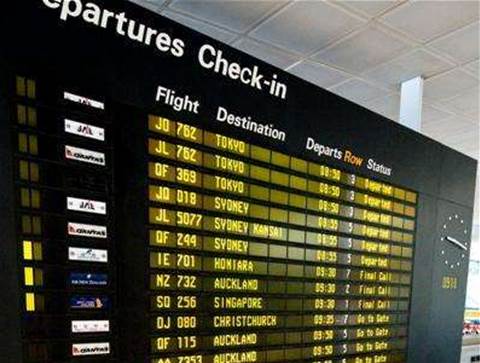A strike tomorrow by Customs and Border Protection staff could put pressure on what Defence says is an already strained system.
Thousands of Customs and quarantine staff will walk off the job in two hour stoppages over public pay offers, the Community and Public Sector Union said.
The strike was expected to cause delays on international flights.
It could also add severly test the customs screening process which the Defence Science and Technology Organisation (DSTO) said was already strained by the limitations of human operators.
A research paper published this month by DSTO researcher Rebecca Heyer highlighted the shortcomings of human operators manning facial recognition, and baggage and passenger screening systems already in use or under consideration at Australian airports. Also to blame were the use of inadequate interfaces and monitoring screens which made recognition even harder.
While human operators were required to pick suspects flagged in a series of photographs produced by facial recognition systems, Heyer said they were found to have a "very poor performance" at distinguishing unfamiliar faces particularly individuals of another race or those who have changed appearance.
Heyer said operators were critical to the success of airport screening technology yet little attention had been paid to understand their role in the systems.
"Limitations need to be understood and accounted for in the development of policy and procedures governing the operation of these systems," Heyer said.
"While much headway has been made towards understanding and improving technical elements of airport security screening systems comparatively little attention has been paid to understanding the role of the human operator."
DSTO evaluations found that current image-based airport security technologies cannot achieve the required level of performance for operations without a "capable" human operator.
Heyer said the performance of screening operators was impacted by the use of poorly-designed interfaces including TV monitors and keyboards which were badly designed.
Operator interfaces must conform to minimum ergonomic specifications but Defence and the Community and Public Sector Union were unavailable to comment on current conditions.
BT chief technology officer Bruce Schneier was an avid critic of popular airport security measures including the screening process.
"Airport screeners have a difficult job, primarily because the human brain isn't naturally adapted to the task," Schneier wrote in a blog.
"We're much less adept at detecting random exceptions in uniform data. Faced with an endless stream of identical objects, the brain quickly concludes that everything is identical and there's no point in paying attention. By the time the exception comes around, the brain simply doesn't notice it."
Schneier said the psychological phenomenon was a problem in many areas where screening is required.
Heyer said the DSTO had focused on the role of operations in the screening process over the last decade.




.png&h=142&w=230&c=1&s=1)

_(21).jpg&h=142&w=230&c=1&s=1)
.jpg&h=142&w=230&c=1&s=1)




.jpg&w=100&c=1&s=0)
_(8).jpg&w=100&c=1&s=0)











